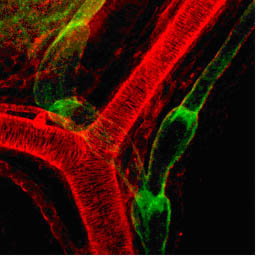We are interested in the molecular mechanisms of cell differentiation and how their deregulation contributes to human diseases, such as cancer and cardiovascular disorders. Our research is focused on key transcription factors that we and others have shown to be important for the development of functional lymphatic vascular system , such as FOXC2, or for the progression of colon tumor cells towards more malignant phenotype , such as PROX1. We are interested in the transcriptional regulation of cell differentiation and the role of transcription factors in human diseases, such as cancer and lymphedema.
One of our projects deals with the mechanisms of cancer progression. The initiating events, such as loss of APC in colon cancer, frequently lead to the development of benign tumors, and in humans many years are required for the transition towards the malignant phenotype. We have shown recently that a transcription factor PROX1 plays an important role in this process via the regulation of cell adhesion and polarity program. We believe that this knowledge is important for our understanding of gastro-intestinal cancers and could provide novel targets for therapy in these diseases. We are currently working on the mechanistic understanding of PROX1-regulated transcriptional network in cancer and producing mouse models, which will be used to characterize normal intestinal homeostasis and colon cancer progression.
Second project concerns the mechanisms of lymphatic vascular development and remodelling. The lymphatic vascular system plays important roles in the removal of interstitial fluid, antigen presentation and the uptake of dietary fat. Damaged or absent lymph vessels lead to tissue swelling or lymphoedema. Our main goal is to understand the processes of lymphatic vascular remodelling and formation of the mature lymphatic vascular network comprising capillaries and collecting vessels. We are studying the fork head transcription factor FOXC2, which plays an important role in specifying collecting or capillary lymphatic vessel type in mammals. FOXC2 occurs in a mutated form in humans with the hereditary lymphatic vessel disease lymphoedema-distichiasis (LD). LD is characterized by late onset swelling of the legs and a double row of eyelashes (distichiasis), which is sometimes combined with cardiovascular or other defects. Current research in the lab focuses on characterization of lymphatic vascular defects in Foxc2 deficient mice, identification of FOXC2 target genes in lymphatic and other endothelial cells and characterization of lymphatic valve morphogenesis.

Collecting lymphatic (green) and blood vessels (red) in mouse mesenterium. Lymphatic valves can be clearly seen as areas of intense green staining. Picture by Camilla Norrmén, 2005.
Principal collaborators:
Dr. Kari Alitalo, Biomedicum Helsinki, University of Helsinki, Finland
Dr. Mauro Delorenzi, Swiss Institute of Bioinformatics, Lausanne, Switzerland
Dr. Naoyuki Miura, Hamamatsu University, Japan




